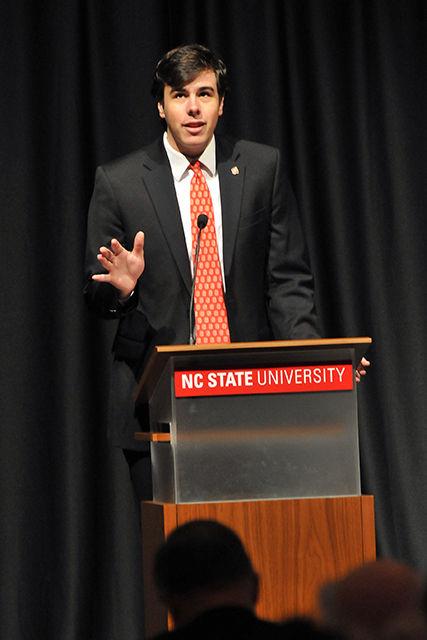Under the presidency of Alex Parker, former student body president of NC State and a senior studying international studies, the Association of Student Government has drafted a five-year strategic plan, something the association has never done before.
During this semester, the second semester of the five-year plan, ASG will concentrate on providing more advocacy trips to Washington, D.C., and Raleigh to speak with legislators about state and national priorities.
ASG also hopes to receive more funding from both state and national governments so it can increase its efforts to advocate for the NC school system, according to Parker.
ASG is the collective student government of all 17 UNC System universities and colleges in North Carolina that deals with issues that pertain to individual campuses, as well as the entire system as a whole. It then takes these issues and addresses them at UNC Board of Governors meetings.
“A lot of policies that impact one campus, impact another campus,” Parker said. “We have to collaborate on things in order to become a more effective, unified school system.”
The five-year plan will allow the ASG to have more structure and efficiency in the long-run, according to Leigh Whittaker, senior vice president of the association, and a senior studying political science at UNC Asheville.
One of the biggest points on the five-year plan’s agenda is switching from a governing association to a more advocating one. As part of the advocacy, the ASG is working with the “It’s On Us” campaign, a national initiative to end college sexual assault.
“We are participating in a movement that is larger than us, and it would be irresponsible not to participate in it,” Whittaker said.
ASG plans to travel to campuses across the state and talk about the “It’s On Us” campaign and how North Carolina students can address the issue.
“We want to see if there are any holes or gaps with how we are dealing with sexual assault,” Whittaker said. “This is a conversation we need to be having and with that conversation, we need to talk about alcohol safety.”
Also in the five-year plan, ASG hopes to create a safety app specialized for each North Carolina campus, according to Parker.
The app will be a central location for resources, such as various 24-hour help lines, and will offer a quick way to contact campus police.
“Before we have those trips, though, we have to look at research and data to make sure we are fully prepared for these discussions,” Whittaker said. “It’s important for us to be prepared because it’s not common for students to leave college towns to come together and advocate for educational purposes. We are passionate about getting federal and state funds.”
Before the five-year plan, officers of ASG usually did not get into the swing of things until late into their term, according to Parker.
“The five-year plan is broad enough to make the administration their own, but structured enough to make sure officers are carrying out ASG mission in a timely manner,” Whittaker said.
As president of the ASG, Parker participates in the UNC Board of Governors meetings and announces what legislation should be made based on the concerns from ASG meetings and discussions.
“I am the student voice of all the student governments from across the state,” Parker said. “I represent the students and bring that voice to the board who needs to hear it.”
The student voice would not be clearly heard without the ASG, according to Parker.
Every full-time student in the UNC System pays one dollar to the ASG as part of student fees, which adds up to about $220,000.
With that money, ASG plans to send underclassmen leaders to professional conferences to teach them how to effectively communicate with legislators.
“We want to invest in young students that that will gain an experience outside of the classroom that is unconventional,” Whitaker said.
Only a few other states have an association that combines college campuses from across the state, according to Parker.
“I’ve talked to so many students from other states, and they say they wish their state offered the same cohesive way to unify all [public] college student governments,” Parker said.








